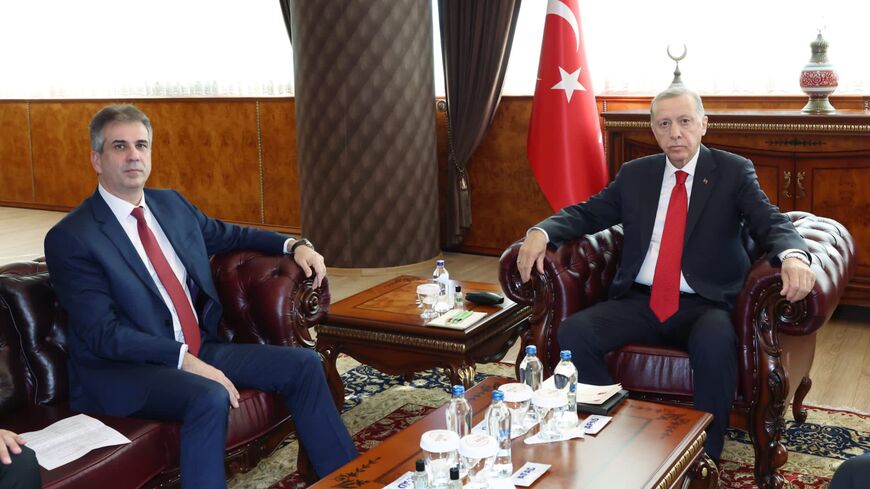Turkish President Recep Tayyip Erdogan received Israel’s foreign minister on Tuesday in Ankara, where Eli Cohen expressed Jerusalem’s support for the victims of last week's earthquakes.
The last such meeting took place five months ago, when then-Prime Minister and Foreign Minister Yair Lapid met with Erdogan in New York, at the sidelines of the UN General Assembly. Israel's new ambassador to Turkey Irit Lillian presented her credentials to Erdogan Dec. 27, officially ending more than a decade of sour bilateral relations. Relations started deteriorating in 2010 after the Mavi Marmara flotilla to Gaza, where nine Turkish nationals were killed by IDF fire, and continued deteriorating over Erdogan's pro-Palestinian anti-Israel stances. That has changed some two years ago, leading to reconciliation between Ankara and Jerusalem.
At the meeting, Cohen conveyed condolences on behalf of the Israeli government and people, and promised Israel would continue providing humanitarian aid to disaster-stricken areas.
Cohen noted that the bilateral relations are important for the stability of the region. He added, "Friends are measured in times of trouble. At this difficult time, Israel is reaching out and expressing solidarity with the Turkish people."
Before meeting with Erdogan, Cohen met in Ankara with Turkish Foreign Minister Mevlut Cavusoglu.
Speaking at a joint press conference with Cavusoglu, Cohen noted that Israel was among the first nations to send rescue teams to Turkey, dispatching than 450 specialists immediately after the earthquake to save lives. "We have brought hundreds of tons of medical equipment and humanitarian aid and built a field hospital to attend those who need medical treatment," added Cohen.
Israel has sent two teams to Turkey. The rescue team, which arrived first, assisted with the search for survivors, managing to find and rescue 19 people from the rubble before returning to Israel on Monday. The second team of medical staff brought some 60 tons of humanitarian assistance including food, medicine, tents and warm clothes. It set up a medical facility that will continue operating for several more days. After his meetings in Ankara, Cohen traveled to the city of Kahramanmaraş in the south of Turkey, where he visited the Israeli field hospital.
At their meeting, Cohen and Cavusoglu also discussed the resumption of direct flights between the two countries by Israeli airlines. Cohen announced that the first such flight is scheduled to depart on Thursday.
The new government of Prime Minister Benjamin Netanyahu is determined to continue the rapprochement between Jerusalem and Ankara reached under the previous government. Erdogan also made it clear after the Nov. 1 elections that he wishes to continue deepening bilateral relations.
However, on Monday, Ankara joined the US State Department and the European Union in condemning Jerusalem over its plans to regularize nine illegal West Bank outposts and promote the construction of thousands of new homes in West Bank settlements.
A statement issued Monday by the Turkish Foreign Ministry warned that these unilateral steps by Israel would further escalate the rising tension in the region. "We call on Israel to end its actions which may trigger a new spiral of violence in the region and contravene international law and the established UN parameters," it read.







